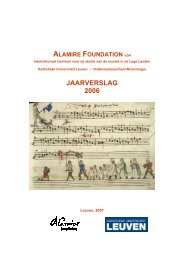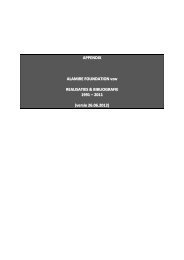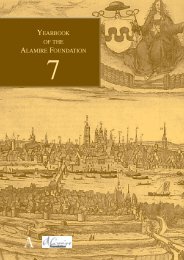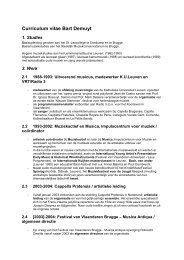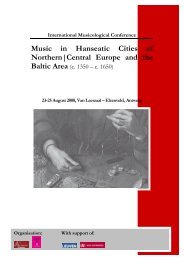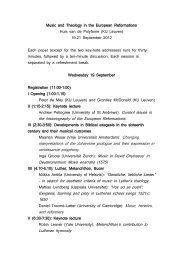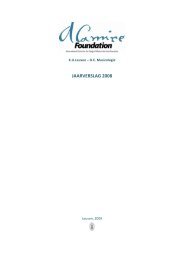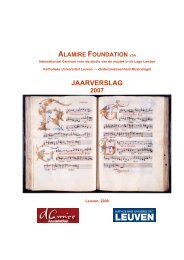YEARBOOK OF THE ALAMIRE FOUNDATION
YEARBOOK OF THE ALAMIRE FOUNDATION
YEARBOOK OF THE ALAMIRE FOUNDATION
Create successful ePaper yourself
Turn your PDF publications into a flip-book with our unique Google optimized e-Paper software.
WHO OWNED LASSO’S CHANSONS?<br />
ment. The set was issued by the firm of Antonio Gardano in 1545, and then promptly<br />
reprinted in an unauthorized (and unsigned) edition by Rore’s old print partner<br />
Girolamo Scotto, later that same year. 20 Such practices as these put Lasso’s new authorial<br />
privilege into sharp relief: no other Renaissance composer had ever been offered<br />
so sweeping an official voice in the control of his creative work. Even in the literary<br />
world the notion of authorial privilege was exceedingly rare during the sixteenth century.<br />
Among Lasso’s contemporaries, only Pierre de Ronsard had the legal right –<br />
sanctioned by royal patent – to control how his works were published. Ronsard’s<br />
privilege of 1554 probably served as a model for the one granted Lasso (see Appendix,<br />
Document 6). 21<br />
Like Ronsard’s privilege, Lasso’s French patent is both retrospective and<br />
prospective, covering works already written and published as well as ones still to<br />
emerge from the pen. Such ‘general’ privileges had the risk of colliding with ones<br />
already issued to printers, as they did in the case of the Imperial decree, as we have<br />
seen in the case noted above. What is especially interesting about these patents is that<br />
they pass over in all but silence the question of monetary compensation for creative<br />
work and instead stress an author’s right to determine how his works would appear<br />
in public. It would seem to modern readers self-evident, perhaps, that published versions<br />
of a work ought to reflect an author’s best intentions for it. But the text of<br />
Ronsard’s privilege strongly suggests that such fidelity had an ‘ethical’ dimension<br />
that touched on broader concerns, too. Recall for that matter the passage on the negative<br />
effects of inaccurate texts: here we learn that the faithful attention to Ronsard’s<br />
texts, which so ably emulate the subtlety, seriousness, sweetness and grace of classical<br />
models, will in time lead to a general renovation of the French language itself.<br />
20 The Gardano motet book is described in LEWIS, Antonio Gardano: Venetian Music Printer, 1, pp.<br />
483–497 [No. 73]. The Scotto print is described in J. BERNSTEIN, Music Printing in Renaissance<br />
Venice: The Scotto Press (1539–1572), New York – Oxford, 1998, pp. 326–328 [No. 52]. Further on<br />
Rore’s privilege, see R.J. AGEE, The Venetian Privilege and Music-Printing in the Sixteenth Century,<br />
in Early Music History, 3 (1983), p. 29. The document in question is transcribed in R.J. AGEE, The<br />
Privilege and Venetian Music Printing in the Sixteenth Century, Ph.D. diss., Princeton University, 1982,<br />
p. 214.<br />
21 Granted by King Henri II on 4 January 1554 (new style), Ronsard’s authorial privilege was first used<br />
in conjunction with De La Porte’s edition of the Bocage from November of that year. The same privilege<br />
is cited in several other editions of major works by Ronsard, issued by various publishers, during<br />
the 1550s. The authorial privilege was renewed by Henri II on 23 February 1559, and again by his successor<br />
François II on 20 September 1560. For a complete transcription of the privilege of 1554, see<br />
Pierre de RONSARD, Oeuvres complètes, ed. P. LAUMONIER, 18 vols., Paris, 1921–1967, 6, pp. 3–5.<br />
Other privileges for Ronsard’s works are listed in P. LAUMONIER, Tableau chronologique des oeuvres<br />
de Ronsard suivi de poésies non recueillies et d’une table alphabetique, 2nd ed., Paris, 1911. Even<br />
the prolific essayist and humanist Michel de Montaigne was bound by a conception of property rights<br />
in which printers, not authors, were understood to ‘own’ published works. For a subtle assessment of<br />
the French privilege system and its economic incentives for authorial revision and renewal, see<br />
G. H<strong>OF</strong>FMANN, The Montaigne Monopoly: Revising the ‘Essais’under the French Privilege System,<br />
in Publications of the Modern Language Association of America, 108 (1993), pp. 308–319.<br />
167



